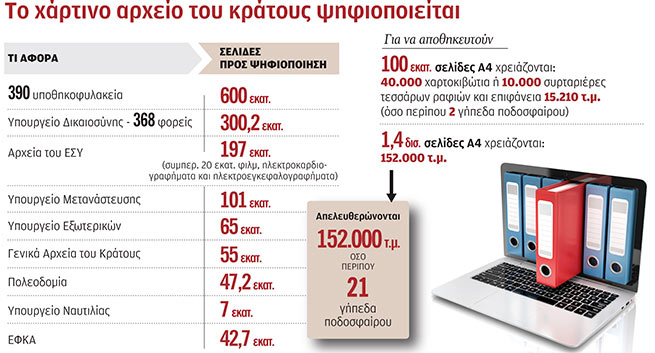According to a 2019 study of bureaucracy in the public sector by the Aristotle University of Thessaloniki, there are 40 “steps” to complete a direct order, such as purchasing office supplies for a university.
The same survey showed that the 32 steps that were in 2014 turned into 40 by 2019. This also led to another important conclusion: out of 40 steps, only five did not require a physical signature on paper.
Stories of everyday madness
Another 2008 study, the result of original work by doctors at Nafplio Hospital, showed that a minor operation and a two-day hospital stay required 61 forms and 44 handwritten notes of the same data on paper, which in total takes up just over four square meters. Most recently, in early December 2021, the Greek edition of Kathimerini shed light on one of the many stories of everyday madness: a Greek taxpayer, in order to confirm his insurance experience abroad, was asked to submit an affidavit that he was… alive!
These are just a few of the amusing, albeit very costly and heartbreaking stories associated with the paper monarchy. It is no coincidence that the word “χαρτοβασίλειο” (paper kingdom) was recorded in Greece as early as 1885. In recent years, the Greek state has been trying to move away from paper in the public sector, and the use of fax machines will be phased out by January 2021. But it is well known that the digitization and implementation of any transactions between citizens and the state through the gov.gr platform will be difficult if state documents remain on paper:
Through the Recovery Fund
“One of the big gaps that the Greek state has is that paper documents have not been digitized. […] A very large amount of money from the Recovery Fund is directed towards digitization to turn paper into digital documents,” Kyriakos Pyrrakakis, Minister of State for Digital Management, said recently. Indeed, the largest project in the history of the Greek state to digitize paper archives is currently being implemented. from the processing carried out by “K” in the specifications of projects that were put out for tender – some of which have already begun to be implemented – it is estimated that more than 1.4 billion pages will be digitized in the next three years, which are currently folded throughout Greece in ministries, EFKA, city planning offices and courts.
1.6 million boxes of documents will be moved from their current location to the company’s premises, which will take over the task of storing them.
To understand what full paper storage means, it suffices to consider that to store 100 million A4 pages – many documents to be digitized are larger – 40,000 cartons (40 million x 30 million x 25 million) or 10,000 four-shelf drawers and an area of 15,210 square meters.
Thus, more than 152,000 square meters would be required to digitize over 1.4 billion pages, which is understandable given that the total built-up area of the planned government park on the territory of ΠΥΡΚΑΛ (which is being built in the Daphni area) is about 133,000 square meters.
The estimates are modest as they do not include records (mostly court records) that it was decided not to digitize at this stage. It also does not take into account the area occupied by the 1.6 million boxes that will be moved from their current storage and management location to the premises of the project company (encapsulation and transport). In fact, some of the archives in these boxes will be stored permanently, and the competent authorities will decide what exactly it will be.
Categorization
Digitizing more than 1.4 billion pages involves not only scanning them, but also convenient categorization based on keywords (metadata) to ensure quick search for the requested information. This is not an easy task, since it requires not only manual work, but also the correct selection of files for digitization.
“One of the prerequisites for a complete transition to digital government is the digitization of paper archives of government institutions and organizations,” says K. Information Society Director General Stavros Astenidis. Some of the largest digitization projects include 3.5 million urban records corresponding to multiple pages, 600 million pages held by 390 mortgage registries, and over 300 million pages held by 368 courts and prosecutors across Greece.
Based on the publication cathimerini.







More Stories
Meeting between Mitsotakis and Erdogan in Ankara on May 13
The Mitsotakis government paved the way for the recognition of the “Turkish Republic of Northern Cyprus” by recognizing Kosovo.
The strike is over – the streets in Athens are open